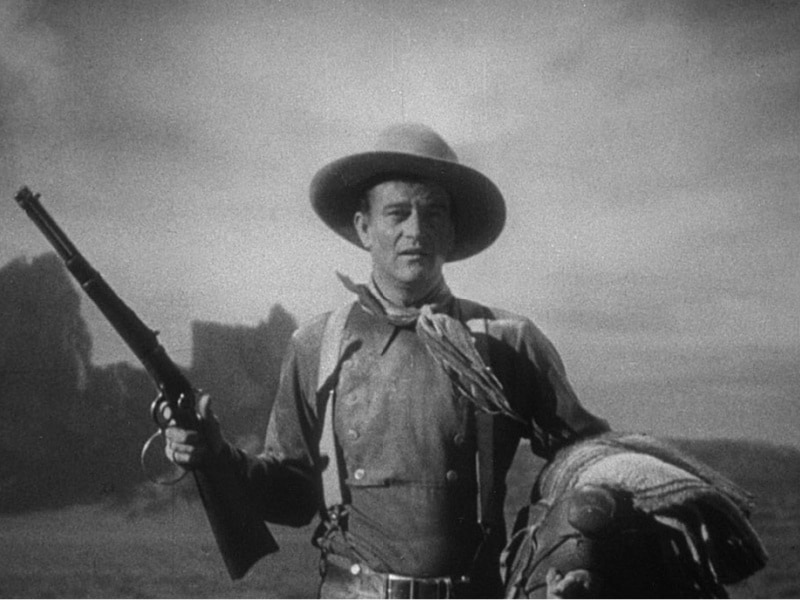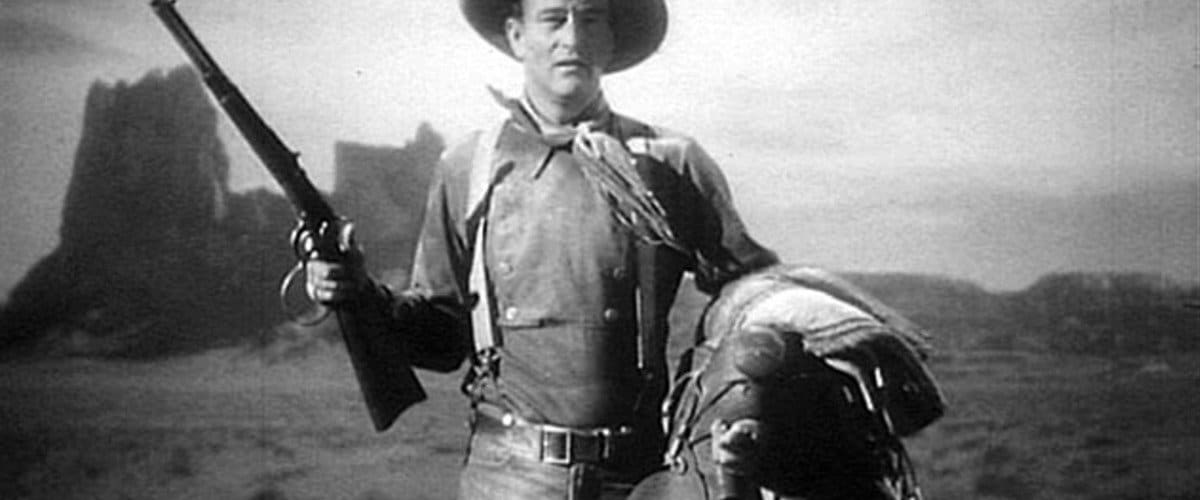
Welcome to Debate Week, the first of what we hope to be many weeks in which we open up a topic of discussion to our entire team. This week: What was the best year in movies, ever? 1939! Throughout the week, our team will each make the case for their chosen year.
When asked what year was the best year for film, 1939 will almost always be in the conversation. It’s probably the easiest argument to make—Gone With the Wind, The Wizard of Oz, Mr. Smith Goes to Washington. Movies that are so iconic and ever-present in American pop culture, you can often feel like you’ve seen them even if you haven’t. And if you haven’t, you’re in for a treat! Sure, we all know Clark Gable’s famous line “Frankly, my dear, I don’t give a damn” (AFI’s number one pick for Best Quote). Maybe you’ve seen it referenced or you’ve jokingly quoted it yourself. However, nothing but the three-and-a-half hour build-up of their tumultuous relationship, ending with that perfect kiss-off, can do it justice.
1939 was a fascinating time in Hollywood. Sound had been properly integrated into the moviegoing experience since its introduction a decade before. “Talkie” movie stars had risen and actors had grown accustomed to the new style of filmmaking. Internationally, the world was an absolute mess, which always drives people to a movie theater and its escapist roots. Hitler was pushing Europe closer and closer to war, Mussolini and Stalin were gaining more power as well. America was in a transitional period, finally recovering from the Great Depression without yet being involved in the war that would start abroad late in the year. Hollywood had their audience rapt with attention, crucial since they released 365 films that year.
The case for 1939 may not be hard to make, but it needs to be made nonetheless. It’s obvious and heralded by many already as the Best Year for film; that popularity doesn’t make it wrong. Not only is it the best year for films, but it’s a year with quite a few of the best films ever made. It is the year with the most films selected for preservation in the National Film Registry by the Library of Congress. Nineteen and counting as just last year, the Howard Hawks-Cary Grant picture Only Angels Have Wings was chosen, showing that we haven’t gotten close to scraping the bottom of what this year has to offer.

Sometimes the Academy gets it right.
Every year, especially those with ten nominees, there is usually a film or two that makes you sit back and wonder: How did this get nominated for an Academy Award for Best Picture? Consider Extremely Loud and Incredibly Close and War Horse of the decidedly weak year for film, 2011. This wasn’t a problem for 1939 since the Best Picture nominees were like the murderers’ row of cinema. Three films already mentioned were nominated: Mr. Smith Goes to Washington, The Wizard of Oz, and the winner, Gone With the Wind. Surely, the rest can’t be as famous? Wrong. There are also the acclaimed adaptations of Wuthering Heights and Of Mice and Men as well as John Ford’s first sound Western, Stagecoach. Additionally, the endlessly imitable Love Affair, which popularized the romance trope of designating a place to meet if the characters are still in love (as seen in the remake An Affair to Remember, Sleepless in Seattle, and that episode of 30 Rock with Peter Dinklage).
Even the films that weren’t instantly recognizable to me proved to be unbelievable films. Dark Victory, a moving melodrama starring Bette Davis as a selfish, hedonistic woman who struggles but finds happiness in her life after being diagnosed with a brain tumor. Goodbye Mr. Chips, a lovely portrait of the life, loves, and losses of an aging school teacher. Ninotchka, a romantic comedy where the odd couple is a capitalist guy and a communist girl directed by Ernst Lubitsch. At the Oscars that year, there were no weakest links, just excellent movies by talented artists being acknowledged and rewarded for their work.
The films left off the Oscar ballot are not to be shrugged off.
We can complain about the films that the Academy overlooks just as easily as harping on the films we feel simply slipped through. Combine modern journalism with the films of 1939 and America would have been drowning in think pieces and video essays defending their favorite films that were “snubbed” by the Academy. There was George Cukor’s The Women, a favorite of mine from the year, which only stars women including Joan Crawford and Rosalind Russell. It plays with adulterous husbands and catfighting ladies on the surface but also highlights the complexities of female relationships in a way not often seen on screen. Another lighthearted comedy is the screwball Midnight, written by Charles Brackett and Billy Wilder. In the movie, Claudette Colbert plays an American showgirl new to Paris with nowhere to stay and no money. Through her ingenuity and luck, she is able to find a cushy deal once she is propositioned by a millionaire who wants her to break up his wife’s affair.
Aside from the relationship comedies, there was also the western Destry Rides Again, starring James Stewart and Marlene Dietrich and including the classic serenade of “See What the Boys in the Back Have.” The Thin Man series received a third installment in 1939 with Another Thin Man. The mystery-comedy is not critically reviewed as well as its predecessors, but it does avoid the oft-disappointing reception of the third film in film series. Hollywood could have just made the ten movies nominated for Best Picture, called it a day, and still been in the running for the best year in film. Instead, they released a plethora of quality films, satisfying all types of audiences.

1939 laid the groundwork for years to come in Hollywood.
One of the best things about film in 1939 is what it allowed to come after. It’s a formative year in the industry and in film, setting up what would dominate the next few years and even decades. Ninotchka marked the first Oscar nomination for writing Wilder received, shared with writing partner Brackett. The duo began working together in 1938, garnered critical acclaim in 1939, and worked steadily for another decade even as Wilder transitioned into the director’s role. Laurence Olivier had another first that year as well; his performance as Heathcliff in Wuthering Heights garnered him his first Academy nod and helped him crossover to Hollywood from the UK.
There were also quite a few discoveries made that I can’t imagine Hollywood without. Ingrid Bergman debuted in her first American acting role in Intermezzo, barely speaking any English and resisting the overbearing studio executives attempting to fit her into their image. Star of Gone with the Wind, Vivien Leigh also transitioned to Hollywood from abroad. The role plus her scandalous relationship with Olivier made her a true Hollywood starlet. Another go-to actress emerged this year as Judy Garland had a double-whammy with The Wizard of Oz and Babes in Arms, cementing her as a favorite of MGM. One of the most iconic men on the screen became an instant star due to his performance in Stagecoach. John Wayne was able to breakthrough with the film and create one of the most iconic filmographies in Hollywood. A few men who had been steadily gaining attention and praise, James Stewart and Henry Fonda, were cemented as full-brown movie stars by the year’s end. Stewart as the incorruptible senator of Mr. Smith Goes to Washington and Fonda as one of the most beloved presidents in Young Mr. Lincoln became the heroic leading men their careers would constantly return.
The very fabric of Hollywood and cinema is tied up in 1939. Remove Bergman from Intermezzo and what happens to Casablanca or Notorious or Gaslight? The films released this year are revered for their cultural impact as much as their storytelling and technical achievements. If you believe the theory that there is only one story being told and everything is feeding into that larger narrative, altering it in its own way, the films of 1939 permanently changed the story.
Related Topics: Debate Week, Old Ass Movies

